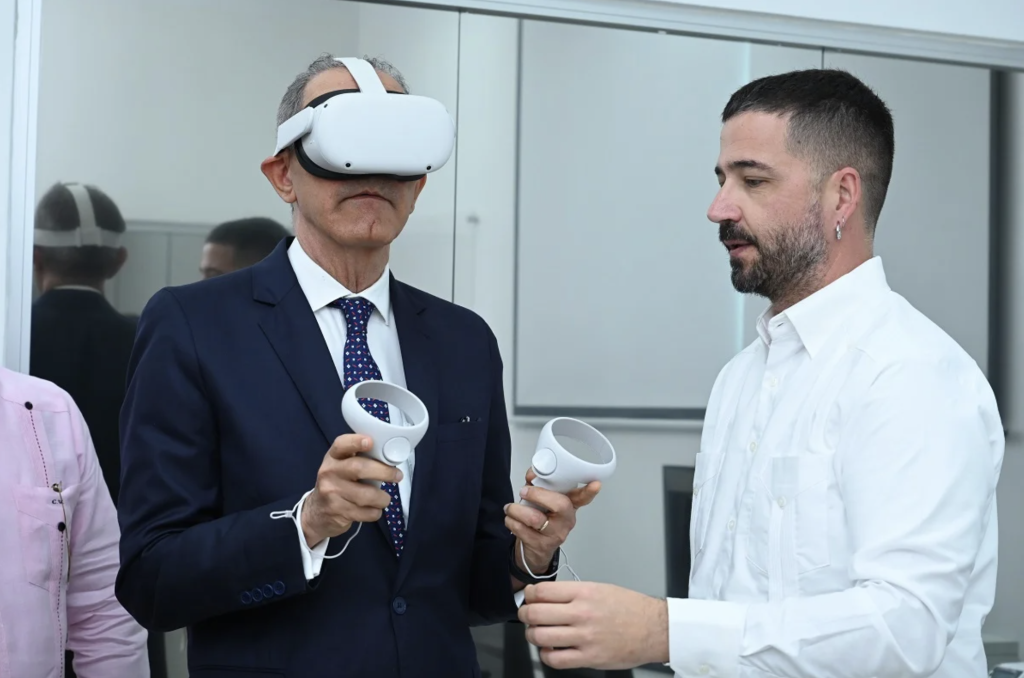
The Instituto Tecnológico de Santo Domingo (INTEC) inaugurated an Extended Reality Laboratory, the first in the country. Extended Reality (XR) is an umbrella term that covers Augmented Reality, Mixed Reality and Virtual Reality. The lab opens to train students and teachers on the use of these new technologies to deal with climate change and comprehensive disaster risk management.
Mixed Reality (MR) is a view of the real world—physical world—with an overlay of digital elements where physical and digital elements can interact. Virtual Reality (VR): a fully-immersive digital environment. Extended Reality (XR) is an umbrella term that covers all these different technologies, including AR, MR, and VR.
For the installation, INTEC has had support from the Didactic Research Group (GID) of the University of Seville, Spain, whose specialists, Julio Cabero and Óscar Gallego, trained INTEC researchers in the use of technological tools and equipment to design objects and resources in virtual reality, augmented reality and extended reality formats.
The laboratory is part of the research, design, production and evaluation of extended reality programs for training in Climate Change and Comprehensive Disaster Risk Management (REFODIGE), which is financed by the National Fund for Scientific and Technological Innovation and Development (Fondocyt), of the Ministry of Higher Education, Science and Technology, and led by INTEC teacher and researcher Jeanette Chaljub.
The program is expected to impact university education overall, as teachers and students are encouraged to share their new knowledge.
During the launch of the Laboratory, rector of INTEC Julio Sánchez Maríñez thanked Fondocyt for the support for the creation of the innovative space whose main commitment is to use technical and pedagogical resources in matters of climate change and risk management.
During the public launching of the XR program, the Higher Education Minister Franklin García Fermín remarked: “This technological laboratory will exert a notable force in the training of human resources capable of guiding the comprehensive management of risks linked to disasters and in innovation processes for the training of technicians and experts in various applications aimed at climate change management.”
Meanwhile, Julio Cabero, external advisor of the project, expressed that the intention is not only that the students use the technologies but that they also become promoters of these technologies.
“One of the great advantages that the pandemic has had is that it has accelerated the digitalization process of all universities, and that has allowed different emerging technologies to begin to quickly enter the university community,” he explained.
In terms of equipment, the new academic space has technical equipment and software to develop educational resources mediated by augmented reality and virtual reality, in addition to enabling other developments such as 3D resources.
The total investment in the laboratory amounts to about RD$11 million, which includes financing from Fondocyt and the counterpart provided by INTEC for the conditioning of the physical space, connectivity and administrative expenses.
The project will analyze whether there are differences in students’ academic performance when they are exposed to content designed in an Extended Reality format and used under the “immersive” and “desktop” modality. Likewise, the program seeks to gauge students’ motivation and level of satisfaction with the new modality.
INTEC researchers intend to use the laboratory to create a virtual community of university professors interested in the educational use of extended reality, virtual reality and augmented reality. The software and work methodology will allow any teacher, with basic training, to develop their own resources.
As Chaljub explained, initially the resources generated as a product of the laboratory’s work will be adapted to the careers in the Basic and Environmental Sciences area of INTEC and, in the medium and long term, the methodology and use of extended reality resources will be expanded to all careers and academic areas of the university, as well as to other interested educational institutions, both at the pre-university and university levels.
The national team of the project includes Josefina Pepín as a co-researcher from the Pedro Henríquez Ureña National University (UNPHU) and Pamela Michel, in charge of Risk Management at INTEC, who serves as a research assistant. Also present were Genaro Rodríguez, Deputy Minister of Science and Technology of the MESCyT and the Vice Chancellor of Research Projects, Linkage and Internationalization of the UNPHU, Claudia Acra, the members of the INTEC Academic Council and a broad student representation.
Read more in Spanish:
INTEC
5 February 2024

